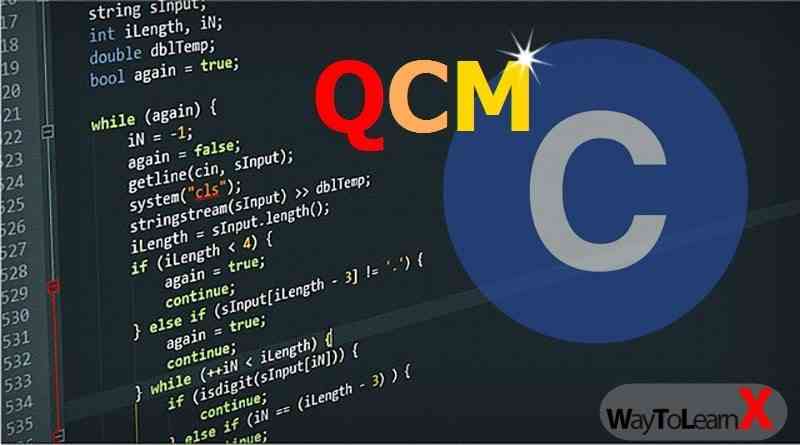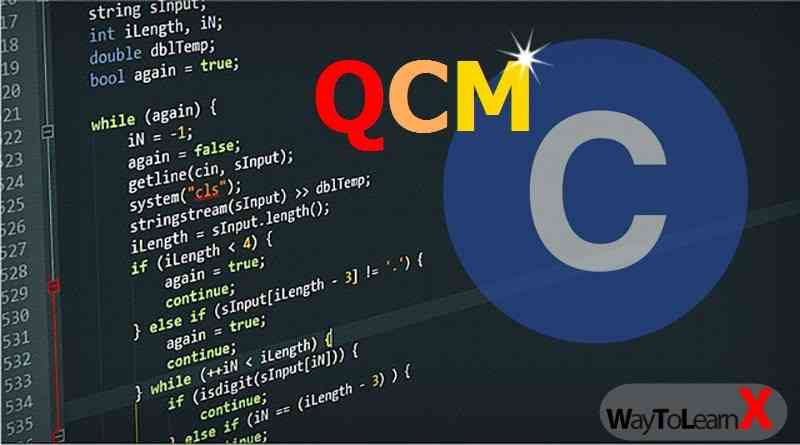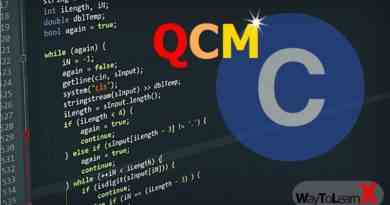QCM en programmation C – Les Constants – Partie 1
QCM sur C avec des réponses pour la préparation des entretiens, des tests en ligne, des examens etc.
1. Quelle est la sortie de ce code C?
#include <stdio.h>
int main()
{
enum {FRAISE = 6, BANANE, POMME = 2, AUBERGINE};
printf("AUBERGINE = %d\n", AUBERGINE);
}
A AUBERGINE = 3
B AUBERGINE = 2
C AUBERGINE = 6
D AUBERGINE = 7
2. Quelle est la sortie de ce code C?
#include <stdio.h>
int main()
{
printf("programmation C %s", "Fonction par \n%s WayToLearnX", "WWW");
}
A
Programmation C Fonction par
WWW WayToLearnX
B
Programmation C Fonction par\n%s WayToLearnX
C
Programmation C Fonction par
%s WayToLearnX
D Erreur de compilation
3. Le pointeur « str » contient une référence vers quelle chaîne de caractére ____?
char * str = "Hello\0" "World!";
A Hello
B Hello\0world!
C Helloworld!
D Déclaration invalide
4. Quelle est la sortie de ce code C?
#include <stdio.h>
#define x 20
int main()
{
const int x = 7;
printf("x = %d\n", x);
}
A x = 7
B x = 20
C Erreur de compilation
D Erreur d’exécution
5. Quelle est la sortie de ce code C?
#include <stdio.h>
int main()
{
int x = 010;
printf("%d", x);
}
A 2
B 8
C 9
D 10
6. Quelle est la sortie de ce code C?
#include <stdio.h>
enum oiseau {MOINEAU, PERROQUET, PAON};
enum animal {LION = 16, LAPIN, ZEBRE, TIGRE};
int main()
{
enum oiseau o = LION;
int k;
k = o;
printf("%d\n", k);
return 0;
}
A 0
B Erreur de compilation
C 1
D 16
7. Quelle est la sortie de ce code C?
#include <stdio.h>
#define MAX 3
enum animal {LION = MAX + 1, LAPIN = LION + MAX};
int main()
{
enum animal a = LAPIN ;
printf("%d\n", a);
return 0;
}
A erreur de compilation
B 7
C valeur non définie
D 3
8. Quelle est la sortie de ce code C?
#include <stdio.h>
#include <string.h>
int main()
{
char *str = "y";
char c = 'y';
char array[1];
array[0] = c;
printf("%d %d", strlen(str), strlen(array));
return 0;
}
A 1 1
B 2 1
C 2 2
D 1 (valeur indéfinie)





La réponse à la question 3 est A
Je comprends pas la réponse de la question 3. Comment se fait il que la réponse ne soit pas A ?
Pouvez vous revérifier la réponse à la question 8 car je pense que c’est D.
Merci pour cette remarque 🙂